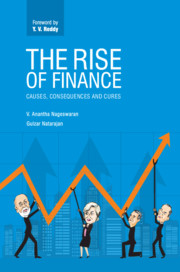3 - Wages, Compensation and Inequality
from Part B - The Consequences
Published online by Cambridge University Press: 02 May 2019
Summary
We examine the consequences of financialization across various dimensions. One is the impact on wages and compensation in America and in the non-financial economy. Second is the human resource misallocation due to financialization. Third is the impact on broader inequality. This chapter analyses these three impacts or consequences and examines the evidence.
Fourth, and perhaps the most important, consequence of financialization is its impact on monetary policy or the capture of monetary policy by finance. In turn, it has global ramifications. Therefore, we dedicate Chapters 4 and 5 to an analysis of the monetary policy framework and monetary policy actions in America and their global consequences. Chapter 4 examines the monetary policy framework that America has adopted. Chapter 5 is an examination of the consequences of UMPs deployed in the wake of the crisis of 2008.
In recent years, attention has turned to the role of finance in the creation and perpetuation of social and class divisions. Inequality is the paramount economic challenge of the twenty-first century. There is increasing realization that financialization has a lot to do with it. That is what we turn to next.
Wages and compensation trends in Finance
Large increases in wages and compensation at the executive levels and widening differential with the remaining employees while not unique to financial markets is most pronounced there. Since the 1990s executive compensation has ballooned (Figure 3.1).
The work of Harvard Law School professor Lucian Bebchuk, an authority on executive compensation trends, has shown how it has distorted incentives all round. His book with Jesse Fried, Pay without Performance, is a devastating indictment of modern managerial capitalism. They document that from 1993 to 2002, the aggregate compensation of the top five executives in all US public companies amounted to 7.5 per cent of all corporate earnings!
In another work, they attribute the incentive distortionary executive compensation practices to the triumph of managerial power over those of diffuse shareholders and conflicted boards, and the resultant separation of ownership and control. Describing such excessive compensation as a rent extraction arising from failure of corporate governance, they point in particular to two features – compensation that rewards executives even for short-term and reversible results which led to accumulation of latent risks, and its linkage only to returns to equity which resulted in highly leveraged bets.
- Type
- Chapter
- Information
- The Rise of FinanceCauses, Consequences and Cures, pp. 53 - 63Publisher: Cambridge University PressPrint publication year: 2019



